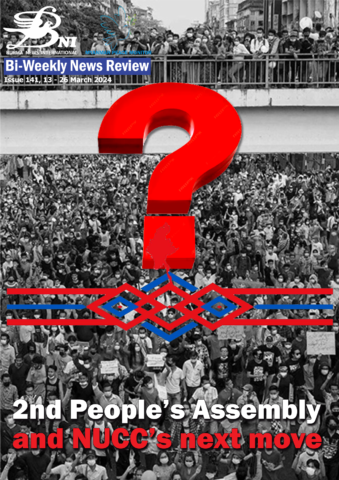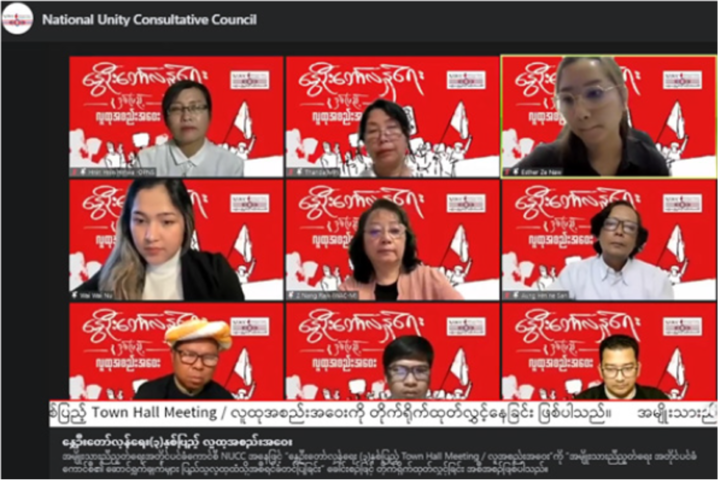
Introduction
8 March 2024 marked the 3rd anniversary of the formation of the National Unity Consultative Council (NUCC). The NUCC, which is made up of forces that are gaining public support in various forms, including elected members of parliament, will be responsible to the People’s Assembly at which a policy was adopted to hold it every six months. Although the 1st People’s Assembly was held in the last week of January 2022, the 2nd People’s Assembly faced a delay. So, the accountability and responsibility of member organizations of the NUCC is questionable.
It has been over two years since the 1st People’s Assembly was held. “Continuing the fight for the elimination of all forms of dictatorship including military dictatorship, and building a federal democracy union which fully guarantees democracy, national equality and self-determination with collective leadership and strength,” is one of 10-point decisions made at the 1st People’s Assembly.
The Burma News International (BNI)-Myanmar Peace Monitor’s bi-weekly news review for this week focuses on the NUCC’s role in the forthcoming 2nd People’s Assembly and the NUCC’s direction, challenges and crises.
The 2nd People’s Assembly
The NUCC announced on 28 March that its 2nd People’s Assembly is scheduled for 4, 5 and 6 April 2024. The NUCC reported to the public at Town Hall Meeting organized as the 3rd Anniversary of Spring Revolution on 1 February 2024 that the People’s Assembly would be held in March. The NUCC reported that the reason for not being able to hold the conference in March was to have enough time for coordination and preparation.
The 8-point resolutions adopted at the 1st People’s Assembly include the facts such as Federal Democracy Charter Part-I and Part-II Interim Constitutional Arrangement is ratified; the NUCC is formed with 33 member organizations representing five clusters; the member organizations of the NUCC ratified the Federal Democracy Charter; the formation of the NUG is reaffirmed by the People’s Assembly; the proposal to revise the necessary Terms of Reference and role to strengthen the leadership of the NUCC and facilitate the coordination between the NUCC and NUG is approved. 1
It is worth monitoring what kind of decisions will be made based on which facts in the coming People’s Assembly. The forces of Spring Revolution feel frustrated by the NUCC’s ability to lead with unity in order to end Senior General Min Aung Hlaing’s coup attempt which has entered 4th year. Now they are monitoring the NUCC’s next move.
The purpose of the People’s Assembly is to coordinate and approve basic principles, policies, strategies, transitional arrangements regarding political, economic and social affairs, security and anti-dictatorship by federal democratic forces working for the elimination of the dictatorship and the building of federal democratic union.
The NUCC’s next move?
The NUCC, which is responsible to the People’s Assembly under the Federal Democratic Charter-Part-II, has formed the coordination committee such as foreign, education, health, gender, Civil Disobedience Movement (CDM) and federal affairs. It is found that the 12-point implementation process or political road map enshrined in the Federal Democratic Charter Part-I are being implemented step by step. On 11 July 2022, the NUCC established a committee to draft the transitional constitution, which is the 8th step of the political road map. On 26 August 2022, the 24-member Constitution Drafting Committee was formed with members and organizations of the NUCC and representatives from the NUG, National League for Democracy (NLD) and Kachin Political Interim Coordination Team (KPICT). 2
The NUCC, which failed to hold the People’s Assembly every six month, presented its actions and challenges to the public at the Townhall Meeting on the 3rd anniversary of the Spring Revolution. The NUCC reported the names of 17 bills, policies and papers pertaining to the people’s police law, foreign policy framework, the paper on transitional arrangements, the military council’s political exit and political process of the Spring Revolution, the humanitarian aid policy, the release of more than 30 statements on politics, military and international affairs during three years, the engagement with 24 countries and 23 local and foreign organizations in international affairs.
At the same time, the fact that a 30 per cent quota for women must be included in different levels of decision-making mechanisms according to the federal democratic charter, has not been fully implemented. The participation of young people is still lacking. Although the People’s Assembly is scheduled for every six months, the 2nd People’s Assembly has not yet been held; and drafting transitional arrangements and transitional constitution has not materialized yet.
The task of organizing and coordinating for the practical participation of all forces with the common goal of ending dictatorship and building a federal democratic union has not yet been implemented. There are also delays in making decisions as decisions are made by common agreement. The above-mentioned challenges were presented at the Town Hall Meeting on 1 February 2024. 3

Ma Hnin Hnin Hmway, Joint Secretary of Democratic Party for a New Society (DPNS) who is also a member of the NUCC reported that efforts are being made to achieve a strong common political agreement with various revolutionary forces, complete transitional arrangements and transitional constitution by 2024 and speed up the operations and decision-making of the NUCC.
Review
Take a look at the NUCC’s report to the public at Town Hall Meeting on the 3rd Anniversary of the Spring Revolution, it can be concluded that the purpose of forming the NUCC in the Federal Democratic Charter Part-II” 4 has not been achieved yet. It must be considered that the NUCC is still unable to fully perform set authorities and responsibilities.
Elected members of parliament, including the Committee Representing Pyidaungsu Hluttaw (CRPH) which has received De Jure Legitimacy from the 2020 General Election, Ethnic Revolutionary Organizations (EROs) which are operating administrative mechanisms with public support within their controlled areas; consultative councils formed on the basis of state/federal units and races, political parties, anti-dictatorship youth organizations, women organizations, labour unions, Civil Society Organizations (CSOs), civil disobedience movement groups, strike committee and all the forces of Spring Revolution including all ethnics and people from all walks of life, shall be responsible for the success of the objectives and functions of the NUCC.
The NUCC, which was born of the military coup in 2021, reflects the unity of the spring revolutionary forces. The NUCC’s leadership, push and move can also be a source of strength for the Spring Revolution whose goal of ending the military dictatorship and building a federal democratic union. So, the NUCC needs to review and seek solutions without putting personal interest, pride, concept and orientations in the forefront by regarding difficulties, crises and challenges the NUCC faced during over three years since its inception as invaluable lessons.
The 2nd People’s Assembly, which is scheduled for the first week of April, will become a new milestone which has risen up in the midst of crises. The People’s Assembly should make efforts to pave the way for the success of the purpose and functions of the NUCC, which was established to end the military dictatorship and build a Federal Democratic Union.
1 The statement on 1st People’s Assembly, 30 January 2022
2 Spring Revolutionary Front (or) the NUCC’s role
3 Town Hall Meeting organized as 3rd Anniversary of Spring Revolution
4 Deciphering Myanmar’s Peace Process – A Reference Guide (2021 – 2022), page-185
